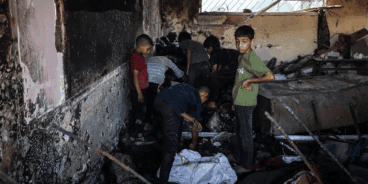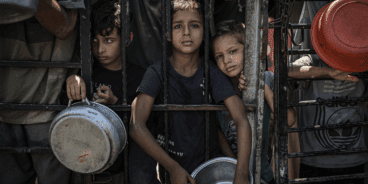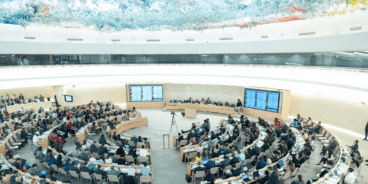
Joint NGO Letter to members of the UN Security Council on the targeting of civilians in Sudan
Dear Ambassadors,
As a coalition of non-governmental organizations working to provide assistance to civilians in South Kordofan and Blue Nile or supporting peace efforts in Sudan, we appeal to the UN Security Council to demand an end to the targeting of civilians by the Government of Sudan’s Armed Forces and associated armed militias. In just four days in May, the town of Kauda and surrounding villages, far from the frontlines of the conflict, were hit by nearly 60 bombs that damaged the offices of the region’s main local humanitarian organization. Bombs also landed next to two schools. Earlier the same month, the region’s major hospital was damaged and two clinics were targeted. These unprecedented attacks represent the largest sustained bombardment of civilian targets in the three year history of the conflict. They have spread terror and sent families into hiding in caves and foxholes, too afraid to plant their crops.
These developments are part of an escalating military campaign across the Two Areas and Darfur that the Sudanese Minister of Defense on 14 April described as the onset of a ‘Decisive Summer Operation’ intended to “end the rebellion in Southern Kordofan, Darfur and Blue Nile.” The Government of Sudan has been vocal and explicit that it is seeking to quash political dissent through decisive military means. It is widely reported that government-sponsored militia in the form of the Rapid Support Forces (formerly the Janjaweed militia) have been recruited and trained by the National Intelligence and Security Services (NISS) to end the rebellion. Monitors on the ground report that the RSF has systematically looted, destroyed grain stores and water boreholes, and burnt houses in areas previously under rebel control. According to the U.N., the conflict between the parties has internally displaced or ‘severely affected’ over 900,000 people in rebel-held areas of South Kordofan and Blue Nile.
This unprecedented escalation in the intensity of the conflict is in direct violation of UN Security Council resolution 2046 (2012). It also coincides with the planting season, which if lost, will result in grave threats of hunger for a population unable to plant. We attach more detailed information, along with links to video and photographic evidence that shows the deliberate targeting of civilians by the Government of Sudan. We are concerned that these actions are in violation of international law and may amount to war crimes and crimes against humanity.
We fear that the continued and intense targeting of civilians by the Government of Sudan threatens any hope of progress towards a meaningful national dialogue that could hold the key to durable peace in Sudan.
We therefore respectfully call on all members of the UN Security Council to unite to adopt a Presidential Statement that:
-
-
- Condemns in the strongest terms the aerial bombing and use of the Rapid Support Forces by the Government of Sudan which are targeting civilians and civilian property in Darfur and South Kordofan, causing mass forced displacement, disruption of livelihoods and loss of life;
- Recognises that these violations of international human rights law and international humanitarian law may constitute war crimes and crimes against humanity;
- Urges the U.N. Secretary-General in consultation with the African Union Peace and Security Council and the League of Arab States, to promptly launch a comprehensive, independent investigation into the breaches of international human rights and humanitarian law and make public the findings of this investigation as a matter of urgency and ensure that those found responsible are held accountable;
- Demands an immediate and unconditional end to all attacks against civilians and civilian property as required under international law and UN Security Council Resolution 2046 (2012);
- Demands an immediate cessation of hostilities by all parties to the conflicts in South Kordofan, Blue Nile and Darfur as an essential precondition to any credible national dialogue which must address root causes of the conflicts; and
- Demands that all parties to the conflict permit humanitarian access to conflict-affected populations regardless of where they are located in the Two Areas and Darfur. All parties to the conflict must ensure the safe, unhindered and immediate access of United Nations and other humanitarian personnel as well as the delivery of supplies and equipment so they can assist affected populations as quickly as possible.
-
The current deadly upsurge in violence and indiscriminate attacks requires timely action by the Security Council, in coordination with the African Union and League of Arab States. Without such leadership being shown by these institutions, we fear that civilians will continue to lose their lives and the prospects for any comprehensive peace in Sudan will remain elusive. We would welcome the opportunity to meet with you to provide further information.
Yours sincerely,
Signatories:
- Action pour les Droits Humains et l’Amitié (ADHA)
- African Centre For Justice and Peace Studies (ACJPS)
- Ahmed H. Adam, visiting scholar and Co-chair of the Two Sudans Project, Institute for the Study of Human Rights (ISHR), Columbia University
- Algeria League for Defence of Human Rights
- Arab Coalition for Sudan (ACS)
- Arab Foundation for Civil Society and Human Rights Support
- Arab Institute for Democracy (Tunisia)
- Arab Network for Human Rights Information (ANHRI)
- Arab Organisation for Human Rights (Libya)
- Arab Organisation for Human Rights (Mauritania)
- Arab Program for Human Rights Activists (APHRA)
- Assistance Mission for Africa (AMA)
- Community Empowerment for Progress Organization (CEPO)
- Conscience International (CI)
- Cordaid
- Darfur Bar Association
- Darfur Relief and Documentation Centre
- Enough Project
- FIDH
- Global Centre for Responsibility to Protect
- Governance Bureau – Sudan
- Human Rights First Saudi Arabia
- Humanitarian Aid Relief Trust (HART)
- International Centre for Policy and Conflict (ICPC)
- International Refugee Rights Initiative (IRRI)
- Khatim Adlan Centre for Enlightenment and Human Development (KACE)
- Kush Incorporated
- Media Centre for Human Rights and Democracy (Shams Centre) – Palestine
- New Sudan Council of Churches
- Nuba Relief, Rehabilitation and Development Organisation (NRRDO)
- PAX
- People4Sudan
- Presbyterian Church (USA)
- Rencontre Africaine pour la Défense des Droits de l’Homme (RADDHO)
- Society for Threatened Peoples – Germany
- South Sudan Human Rights Defenders Network (SSHRDN)
- South Sudan Human Rights Society for Advocacy
- Sudan Consortium
- Sudan Democracy First (SDFG)
- Sudan Social Development Organisation UK (SUDO UK)
- Sudanese Development Initiative (SUDIA)
- Union des Ressortissants Rwandais au Sénégal (URRS)
- United to End Genocide
- Waging Peace
- West African Refugees and Internally Displaced Persons Network (WARIPNET)
- Zarga Organisation for Rural Development (ZORD) – Sudan
***
Annex
Multiple, credible and verified sources from the ground, accompanied by video footage and photographs, have recorded that from 26-30 May almost 60 bombs were dropped from Antonov planes and Sukhoi jets on villages around Kauda, South Kordofan. The main local humanitarian organisation in the Nuba Mountains (Nuba Relief Rehabilitation and Development Organisation – NRRDO – in Heiban County) was attacked and significantly damaged. Many of these bombs landed in the Kauda market, a place where people shop, drink tea and pray in the local mosque; others fell near a school. This follows the bombing of the Mother of Mercy Catholic Hospital in nearby Gidel on 1 st May, which is the major hospital in the Nuba Mountains. These structures are clearly civilian and humanitarian, and cannot be confused with any sort of military target. Kauda is in the heart of SPLM-N territory but far from the front lines.
The bombing, which includes the increased use of parachute-retarded bombs against civilians, has been accompanied by the scaled-up use of heavy shelling by both long-range artillery and highly indiscriminate multiple-launch rocket systems. This is most evident and documented in Rashad, Abisseya and recently Dalami counties, north of Kauda. The U.N. reports that over 100,000 people have reportedly been displaced from this area over the last month. There are further reliable reports through monitors on the ground of systematic looting, destruction of grain stores and water boreholes, and burning of houses in areas previously under rebel control. It is widely reported that government-sponsored militia in the form of Rapid Support Forces (formerly the Janjaweed) have been recruited and trained for such activities.
This latest bombing campaign coincides with the planting season before the start of the rains. Civilians are terrorised by the threat that bombs could hit at any moment in any location, and are being prevented from cultivating their land at this crucial time. This has led some people to conclude that the Government of Sudan is again using hunger as a weapon of war as it did in the previous Nuba conflict from 1989 to 2002. Failure to plant will significantly contribute to food insecurity for the local population for the next 18 months. The current situation is all the more precarious because of the crisis in South Sudan, which has disrupted what minimal supply lines existed for communities in Nuba to receive goods from areas outside the Two Areas. The conflict and instability in South Sudan also means that civilians feel entrapped in the Nuba Mountains, unable to seek refuge anywhere.
Credible reports show violations are also conducted on the rebel side. Monitors on the ground do not take sides but focus on what can be reported away from the frontlines (mostly from displaced communities) and on the most egregious atrocities.
Related Content


Atrocity Alert No. 448: Israel and the Occupied Palestinian Territory, Sudan and China
